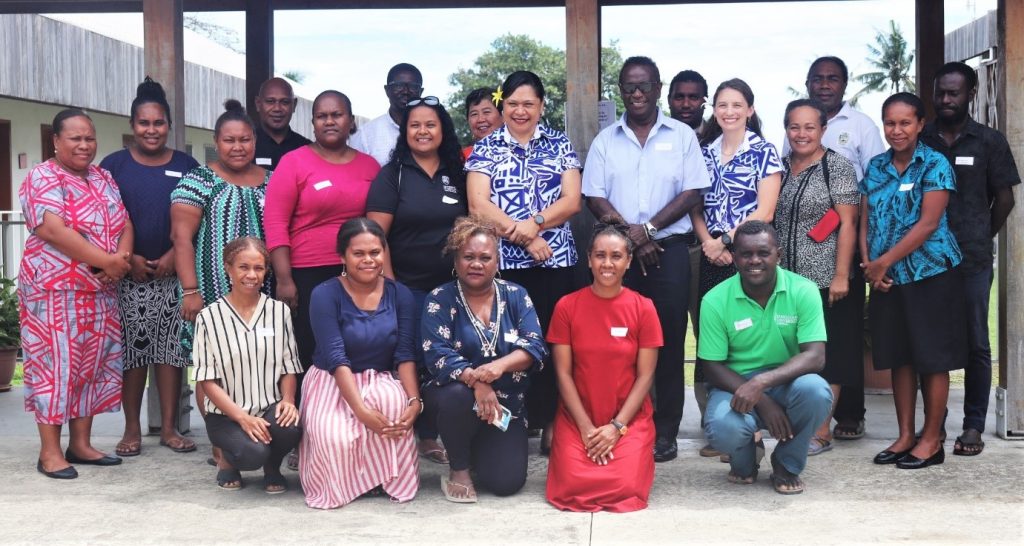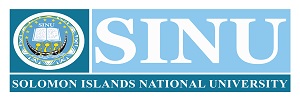05-04-2024
𝑷𝒓𝒆𝒔𝒔 𝑹𝒆𝒍𝒆𝒂𝒔𝒆

The Solomon Islands National University (SINU) this week successfully hosted a second Research Roundtable on “Addressing Harm in Distant Water Fishing in Solomon Islands Waters.”
The second Research Roundtable was held at the SINU Department of Fisheries Studies on Wednesday 03 April 2024 attended by key stakeholders.
In his opening remarks during the roundtable, SINU Vice-Chancellor (VC) Professor Transform Aqorau highlighted that the stakeholders’ collective endeavour remains critical in addressing the multifaceted issues posed by Distant Water Fishing (DWF) in our waters, stating a subject that not only impacts our marine resources but also touches on the very fabric of our social and economic wellbeing.
Prof.Aqorau said given the paramount importance of social accountability in the fishing sector, a comprehensive Social Conditions Gap analysis, encompassing both domestic and foreign fishing vessels licensed to operate in Solomon Islands waters, would be invaluable.
This holistic approach would entail the following objectives:
- Assess Company and Fleet: Conduct a thorough Risk Assessment (Tier 2 and 3) across both Solomon Islands domestic industry and foreign fishing vessels licensed by the Ministry of Fisheries and Marine Resources (MFMR). This inclusive assessment aims to pinpoint potential risks and improvement areas in social accountability practices across the entire fishing sector operating within Solomon Islands jurisdiction.
- Inform: Equip both the MFMR and all fishing companies operating in Solomon Islands, including those based locally and foreign entities, with comprehensive insights into their current Social Accountability standings in relation to global best practices, standards, guidelines, and policies. This information dissemination is vital for understanding the Solomon Islands’ position in the international arena and pinpointing enhancement opportunities.
- Guide Planning & Support: Provide systematic planning and support to address Social Accountability expectations for all assessed entities. This includes offering strategic guidance to both domestic and foreign fleet companies to elevate their social accountability practices to align with international norms and standards.
- Enable: Facilitate the Solomon Islands fishing sector, encompassing both local and foreign fleets, to attain and surpass the social accountability standards required for global market access and stakeholder satisfaction. This facilitation will ensure the sector not only adheres to international standards but also secures a competitive advantage in the global market.
- Verify and Assess On-site: Execute comprehensive on-site benchmark reviews (Tier 4) for the entire Solomon Islands Tuna Industry, including foreign vessels licensed to fish in Solomon Islands waters. This initiative will foster internal improvements in crewing and offer guidance to enhance overall competence, implementation, and transparency in on board labour practices.
- Capability Building: Provide ISO19011 training to MFMR compliance officers and representatives from both domestic and foreign fleets operating under Solomon Islands licenses. This will bolster internal auditing capabilities, with a potential for a comprehensive capability-building needs analysis and program design to meet identified requirements
Prof Aqorau said incorporating both domestic and foreign fleets into this comprehensive assessment framework will ensure a holistic approach to improving social accountability standards in Solomon Islands’ fishing industry, aligning it with global best practices and enhancing its international standing.
He added, to support the Ministry of Fisheries and others working in the social accountability space within the fishing industry, SINU can play a pivotal role by leveraging its academic and research capabilities.
He said SINU can contribute through the following suggested programs; providing capacity building and training programs, Research and Development Initiatives, Academic Programs, Policy Support and Advocacy, and Technological Advancement and Innovation.
He said by integrating these elements into its strategic focus, SINU can significantly contribute to enhancing social accountability in the fishing industry, supporting the Ministry of Fisheries and other stakeholders, and ultimately fostering sustainable and ethical fishing practices in Solomon Islands waters where he said SINU stands ready to be a catalyst for chance.
“Through comprehensive training programs, targeted research initiatives, robust academic offerings, and active policy support, SINU can significantly influence the trajectory of sustainable and ethical fishing practices in the Solomon Islands.”
Prof.Aqorau holds the view that the journey towards achieving social accountability in our fisheries is a shared responsibility that requires a collective effort of the Ministry of Fisheries, industry stakeholders, academic institutions, and the community at large.
“As SINU aligns its resources and expertise with the needs of the industry and the aspirations of our society, we are not just preparing for compliance with international standards; we are fostering a culture of integrity, sustainability, and respect for human rights in our waters.”
With that, the SINU VC said let us therefore embrace this challenge with a sense of urgency and commitment.
“I call upon each one of you, as stakeholders in the future of our fisheries, to support and engage with the initiatives of the SINU.”
“Together, we can set a new standard for social accountability in the fishing industry, creating a legacy of responsible stewardship of our ocean resources that will resonate beyond our shores and into the global arena.”
The first roundtable was held on the 9th of November last year.
Attending the second roundtable meeting were representatives from; Conservation International, Ministry of Fisheries and Marine Resources, Solomon Islands Maritime Authority, WorldFish, Oxfam and SINU Department of Fisheries Studies.
End////////////////////
